
- Home
- About Us
- Sustainability
- Investors
- News
- People & Culture
-
Regions
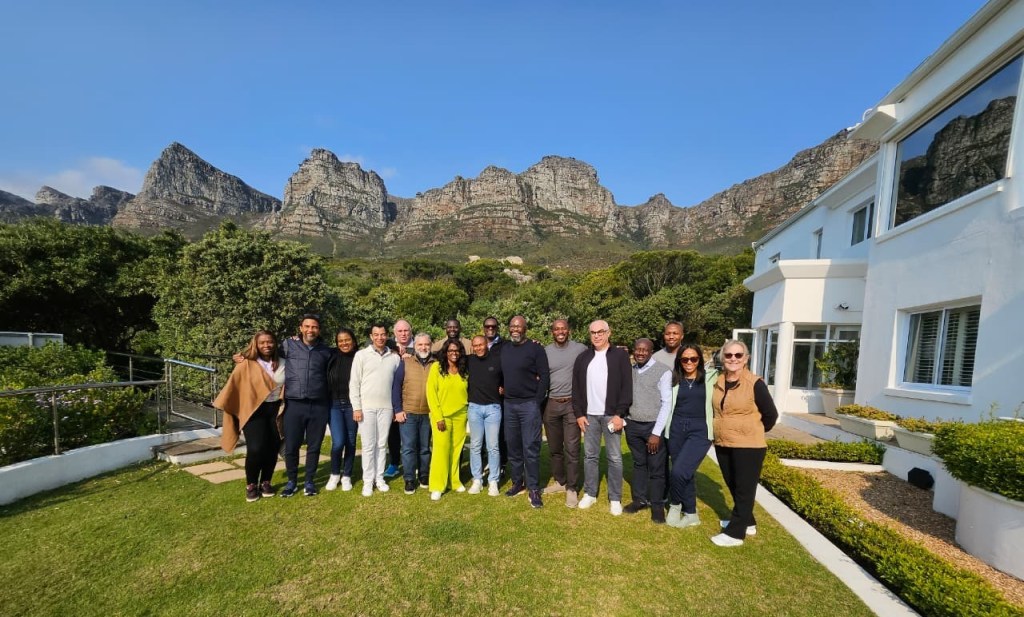
It’s been 10 days since the release of what I consider the best set of MTN financial results in my eight years at the Group, and time for a quick update.
Firstly, I want to thank you all again for your incredible hard work and commitment in the first half of this year which led to the delivery of the amazing results that I was proud to present to stakeholders on the 18th of August.
Every day, I am inspired by the nearly 17, 000 MTNers who work tirelessly across our 16 markets to provide leading digital solutions for Africa’s progress. Thank you all so much, you really are making a difference in the lives of Africans.
Since the release of results, Tsholo and I have been on the first leg of our investor roadshow, which takes us across South Africa, United Kingdom and the United States. We have concluded the first leg of these meetings in South Africa and met our major shareholders. These meetings have been very good, and we are encouraged by the support we have for our strategy and strong financial results.
In this time, we have also released the first in our new vodcast series called ‘The Y’ello Chair’. If you haven’t had a chance to watch it, please do! In it, I say that with all humility, I think MTN is the most important company on the continent because we are at the forefront of driving digital inclusion which is essential for Africa to develop to its full potential.
Over the past three days, I have been meeting with my colleagues on the Executive Committee, in our first monthly meeting since changes to the Exco – which are effective on 1 November – were announced with results.
As I said at the time, the rationale for the changes was aligned to our strategy as we look beyond 2025 and position MTN for growth over the next three to five years towards 2030. We are on an exciting journey to create three platforms that will power Africa’s digital transformation and growth: Connectivity, Fintech and Digital Infrastructure.
I am most encouraged by the Exco meeting, and how we are moving forward together as a team, all dedicated to the wider Group mission and strategy.
During our off-site gathering, we were privileged to spend time with renowned US presidential historian Doris Kearns Goodwin. A Pulitzer Prize-winning, #1 best-selling author, Doris shared her extensive experience (including working in the White House with President Lyndon Johnson) and her vast knowledge of leadership.
She spoke about key leadership qualities as well as various themes. She provided a lot of food for thought.
Among the many valuable takeaways, she spoke about the need for resilience, diversity, agility and knowing when to rest and relax when you are leading in challenging and turbulent times. She also spoke about temperament as an important form of diversity on strong and resilient teams.
After three days with the Exco, I asked for her observations of us as a team. She said: “I’ve never seen such a group of people who were willing to talk to each other…It is a wonderful group of people – strongminded, laughing, hardworking.”
Of course, leadership does not only refer to the Exco – we are all leaders in different ways – and Doris’s enthusiasm was infectious! I would encourage you all to take inspiration from this remarkable 82-year-old and to read her books. (Among my favourites is “Leadership in Turbulent Times”.)
During the Group Exco offsite, we also focused on the transition priorities to 1 November 2025. We will be engaging all who are are affected by these throughout the month of September 2025. Our aim is to ensure a smooth and orderly transition that sets us up for a strong finish to the year as well as a strong start to 2026.
I believe I speak on behalf of all my Exco colleagues when I say that it is a privilege and honour to be in the leadership of Africa’s most important company. Our work is not always easy, but it’s essential and it’s transformative for the people of Africa. We are at the forefront of driving digital and financial inclusion for Africa and changing lives.
We will update you periodically as we are progressing on the transition to 1 November 2025, but if you have any questions in the interim, please send these to your respective group Exco members or message me on “Ask Ralph” on the MTNMove app.
Let’s keep pushing ahead!
Ralph
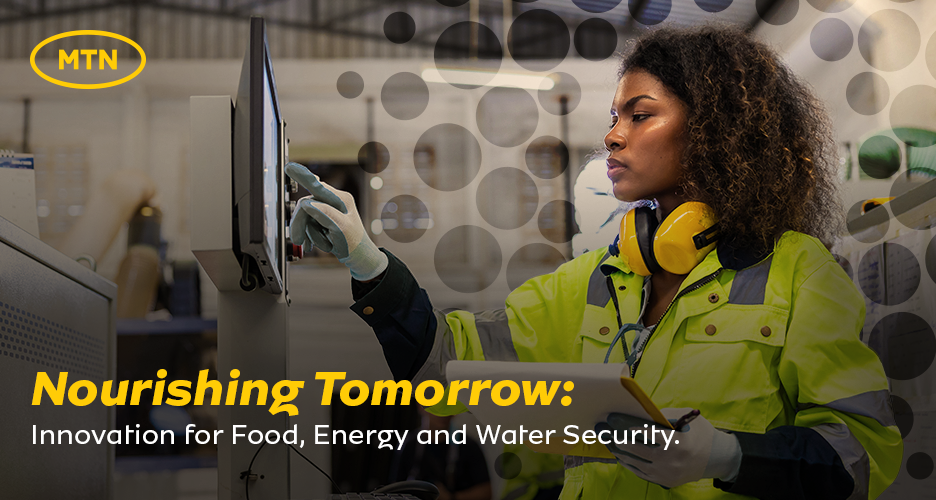
Why investing in eco-entrepreneurship is the smartest bet for Africa’s resilient future
Africa is the youngest continent in the world, with over 60% of its people under the age of 25. This demographic dividend, if nurtured, has the power to reshape our economies, societies, and planet. Yet, it is also the most vulnerable generation growing up amidst rising food insecurity, climate shocks, water scarcity, and an energy transition that is both urgent and uneven. How Africa responds to these intertwined challenges will define whether this century becomes one of resilience and shared prosperity, or one of exclusion and fragility.
The Africa PachiPanda Challenge, now in its second year, is MTN’s bold response to this reality. This pan-African youth innovation platform empowers eco-entrepreneurs to design solutions at the intersection of the Food-Energy-Water (FEW) Nexus, the foundation of resilient livelihoods. The theme for 2025, “Nourishing Tomorrow: Innovations for Food, Energy and Water Security”, is not simply a slogan. It is a call to action in a region where:
These numbers are not just statistics. They are daily realities shaping the futures of young people who, paradoxically, are also the ones driving the solutions.
This year, the Challenge expands to five countries: Nigeria, South Africa, Zambia, Cameroon and, for the first time, Uganda. Uganda’s inclusion is particularly significant. Known as the “Pearl of Africa,” Uganda faces rising climate variability, with floods and droughts threatening agriculture. For Uganda, the Food-Energy-Water nexus is a lived reality, making youth innovation vital for resilience, livelihoods, and inclusive growth.
What makes PachiPanda different is its dual focus: a continental framework that galvanises youth around the FEW Nexus, and local environmental challenge statements that reflect the specific realities of each market. From tackling the impacts of unpredictable weather in Nigeria and pioneering green entrepreneurship in Zambia, to enhancing water conservation in South Africa and developing sustainable energy solutions in Cameroon, and now resilience-driven food and energy solutions in Uganda, the Challenge recognises that solutions must be both scalable and locally rooted.
In 2024, we received 2,484 applications and developed 53 finalists through the in-country programmes. Among the standout innovators, chosen by a distinguished panel of judges for its outstanding scalability and measurable impact, Moses Afopezi of Cameroon claimed first prize for his project AgricFresh, a tech-enabled platform designed to reduce post-harvest loss by professionalising farm management and enhancing market access.
Africa’s youth bring more than energy and ideas. They bring a lived understanding of the problems and a willingness to challenge orthodoxies. With the right enablers, access to knowledge and skills, mentorship, networks, and catalytic funding their innovations can transform not just communities but entire value chains. Just as importantly, enabling policies that promote renewable energy, sustainable agriculture, and water conservation will determine whether such solutions remain prototypes or become scaled engines of growth.
At MTN, we believe that technology, connectivity and youth innovation together form the most powerful levers of change. Through PachiPanda, in partnership with the World Wide Fund for Nature (WWF), and others, we are building a platform where ideas can mature into enterprises, and where eco-entrepreneurs can be recognised as leaders of Africa’s green and digital transformation.
This is an investment for a sustainable future that works. By nourishing tomorrow, these young innovators are not only feeding families, powering homes, and conserving water, they are also strengthening Africa’s competitiveness in a world where sustainability is fast becoming a driver of trade, capital flows, and consumer choice.
The inaugural challenge showed us what is possible. The 2025 edition raises the bar: bigger ambition, stronger partnerships, and a sharper focus on the interconnected systems that sustain life. We must listen to these young voices, back their ideas with resources, and integrate their innovations into national and continental development strategies.
Because the truth is simple: if Africa’s youth win, Africa wins. And if Africa wins, the world inherits not only a resilient continent but also a generation that has proven that hope, ingenuity, and courage can indeed nourish tomorrow.
[1] Food and Agriculture Organisation 2022 report
[2] United Nations Sustainable Development 2025
[3] World Economic Forum 2023

By Marina Madale, Executive: Sustainability & Shared Value, MTN Group and Monde Twala, Senior Vice President, Paramount Africa
“The digital world is no longer a place young people visit, it’s where they live.” – Marina Madale
“When we use platforms like MTV to spark difficult conversations, we shift from entertainment to real impact.” – Monde Twala
Last week, MTN and MTV Base launched The Room of Safety with the premiere of its first episode, “Why Internet Safety Matters”—a bold and timely response to the evolving risks and responsibilities facing Africa’s youngest digital citizens. With AI companions on the rise and social feeds curating idealised versions of reality, today’s online experiences are more immersive, personal, and emotionally charged than ever before.
While AI, deepfakes, and virtual influencers may sound like Silicon Valley phenomena, their consequences are playing out daily in African households, often on entry-level smartphones with little adult oversight.
The Invisible Friend on the Other Side of the Screen
Across MTN markets, over 70% of internet users are under the age of 30. In MTN-commissioned research with IPSOS across three African countries, 1 in 3 youth reported interacting with an AI companion, chatbot, or virtual assistant, many for emotional connection, curiosity, or entertainment.
“Young people turn to these AI tools in search of support, validation, even companionship,” explains Monde Twala. “But we must ask, are these systems equipped to deal with emotional complexity, or are they simply mimicking empathy to keep users engaged?”
Twala adds that The Room of Safety was intentionally brought to life through MTV Base, one of the continent’s most influential youth platforms: “We wanted to use a trusted cultural voice not just to entertain, but to educate. These conversations can’t live in policy papers, they need to be in playlists, timelines and conversations with real-life resonance.”
Why It Matters Now
In the first episode, young people reflect on the emotional pressure of navigating online life. “Comparison is the thief of joy. It’s a quote I live by,” shares Yanda Woods in the episode, capturing the silent impact that curated perfection can have on young people’s mental health. Foyin Ogunrombi adds, “The difference between real success and the curated version we see on social media is exactly that—social media is heavily curated.”
In a digital landscape where perfection is the norm and imperfections are hidden, many young users are left feeling inadequate, isolated, and increasingly drawn toward online artificial relationships that don’t always serve their emotional needs.
A 2023 UNICEF study on Child Online Protection in Sub-Saharan Africa found that 47% of adolescents in urban centres had encountered harmful or inappropriate content online, often pushed by opaque algorithms designed for engagement, not care.
Critical Thinking Is Now a Survival Skill
“We’re no longer just teaching digital access—we’re teaching digital discernment,” says Marina Madale. “Today’s youth must know how to ask: Who built this? Why is it suggesting this? Is it helping me, or harvesting me?”
She recalls a question raised: “If an AI bot gives you advice that makes you feel worse, is it your fault for listening?” It’s a troubling thought, but one that reflects the confusion many young users face when lines between real and artificial support are blurred.
The Room of Safety encourages not just awareness, but self-inquiry, empowering youth to approach digital platforms with more confidence, agency, and understanding.
One Simple Act That Could Save a Life
One of the most powerful takeaways from Episode 1 is the reminder that you are enough, even without the filter. In a world that constantly measures worth through likes, follows, and curated perfection, the ability to believe in yourself, without needing external validation, is a radical act of self-preservation.
TheRoom of Safety encourages young people to turn inward for affirmation and to trust their instincts, rather than relying on AI companions or online approval to feel seen. Building self-worth from within is not easy, but it is essential, and often begins with honest conversations, not with machines, but with real people: a teacher, a caregiver, a sibling, a friend.
To support this, MTN’s campaign includes direct links to mental health services, child protection resources, and regional helplines across its markets. These are not just add-ons, they are lifelines.
A New Digital Mandate for Africa
With the youngest and fastest-growing online population in the world, Africa faces a pivotal moment. The task ahead is not just to connect, but to protect. The Room of Safety is a rallying cry, not to fear technology, but to shape it with intention and empathy.
“When platforms like MTV are used to spark difficult conversations, we move from passive awareness to real impact,” says Monde Twala. “This campaign is about creating spaces that are not only engaging, but safe and transformative.”
Marina Madale concludes, “The same technology that threatens can also be used to empower, if we give our children the tools to engage with it wisely. The Room of Safety is just the beginning of that journey.”
The next episode will explore cyberbullying, where to draw the line between banter and harm, and how to speak up when it matters most.
Until then, we are left with a question:
If a young person is turning to a chatbot to feel seen, will the digital world they find be a bridge, or a blindfold?
The answer may shape the next generation of Africa’s digital future.
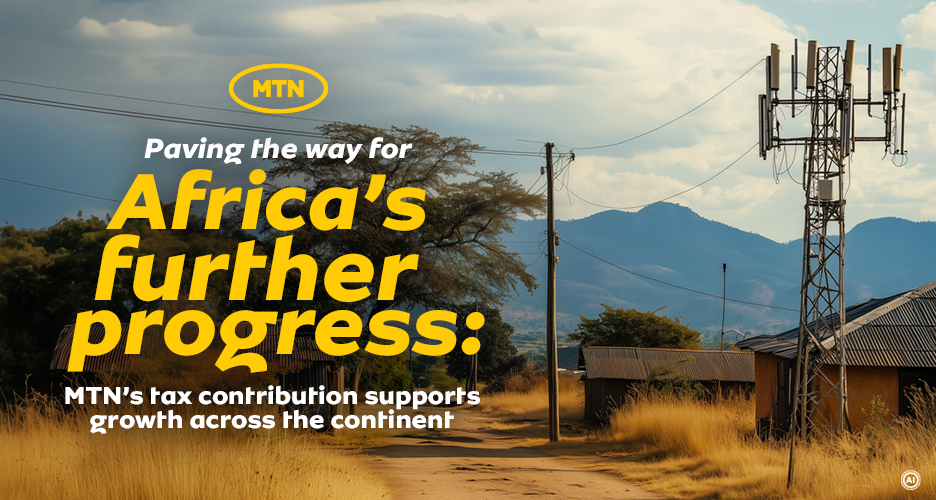
Some 13 000km of new roads could be built with the R52.7 billion of total tax contributed (TTC) by MTN Group to the revenue authorities across the continent in 2024. Of this, MTN contributed R11.7 billion in Ghana, R9.1 billion in Nigeria, R6.4 billion in Uganda and R5.4 billion in South Africa.
These funds include the direct corporate taxes we pay, indirect taxes, operating licence fees, payroll taxes, property rates, dividend taxes and withholding taxes to these governments, as well as those to the revenue authorities across our other 12 markets.
“Using a ballpark figure of around R4 million as the cost to build one kilometre of road, our total tax contribution in the year is the equivalent of building more than 13 000km of roads,” said MTN Group Chief Financial Officer Tsholo Molefe.
Of course, governments could use the taxes we contribute for a wide range of purposes besides investing in infrastructure. This could include employing doctors, nurses and teachers; providing welfare support to the elderly and very young; buying medicines for rural clinics as well as food and learning materials for pre-schools, not to mention various other public services.
“Our tax contribution is key to our licence to operate, as well as to our reputation as a responsible, compliant corporate citizen,” said Molefe, adding that MTN’s pledge to pay its fair share of taxes supports the strong relationships it has with customers, communities and governments.
It also helps its host countries attract foreign direct investment by supporting greater business environment predictability, in turn creating jobs and stimulating economic activity.
MTN’s Tax Transparency Report is released every year as part of the Group’s suite of annual reports. It details MTN’s overall economic contribution beyond the corporate taxes it pays. It also outlines the evolving tax environment across the world and in Africa and discusses MTN’s approach to tax and its tax governance. It gives MTN’s TTC by market, as well as its effective tax rates.
The numbers show that MTN’s West and Central Africa (WECA#) region accounted for 52.8% of the independently assured TTC number in 2024. Nigeria made up 17.3%; the Southern and East Africa (SEA^) region accounted for 17.1%; and MTN’s contribution in South Africa was 10.2% of the TTC.
“We are humbled that the taxes we pay contribute to accelerating Africa’s digital future and to giving Africans hope, dignity and opportunity,” said Molefe. “We invite stakeholders to read our Tax Transparency Report for information on one of the ways we do this, in addition to our primary activity of providing Africans with the essential services required to communicate.”
For our 2024 Tax Transparency Report, please see MTN Group’s 2024 suite of reports
#WECA region – Ghana, Cameroon, Côte d’Ivoire, Benin, Congo-Brazzaville and Liberia.
^SEA region – Uganda, Rwanda, Zambia, South Sudan, Botswana (joint venture, equity accounted) and eSwatini (joint venture, equity accounted)
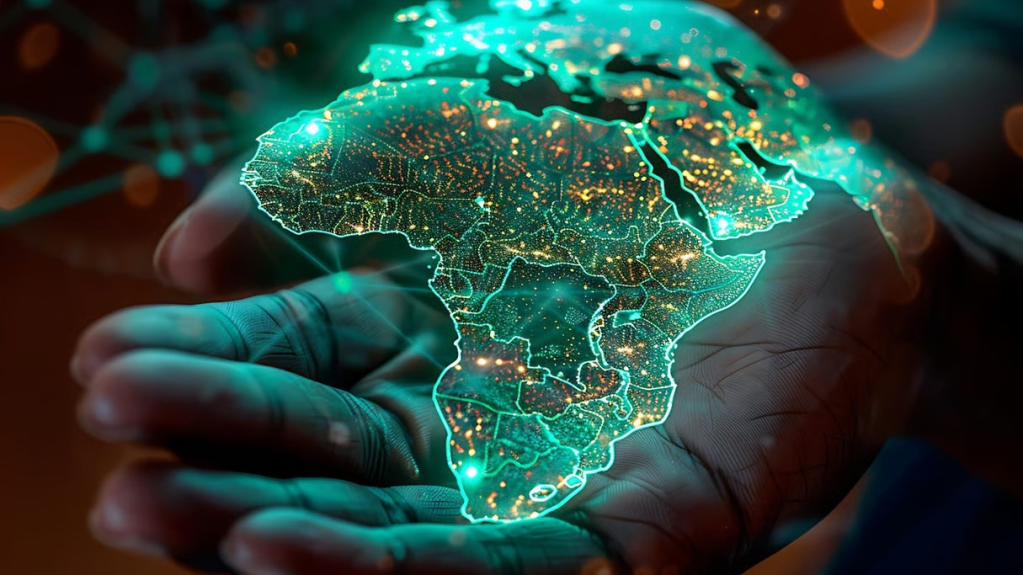
In November 2024, MTN South Africa launched the Icon 5G smartphone, priced at R2,499 (about $138). Designed to make high-speed internet affordable to underserved populations, the launch was not just a nod to corporate social responsibility (CSR); it was also a strategic move to tap into an underutilised market of digital users. As Sub-Saharan Africa remains one of the least connected regions globally, efforts like this highlight how CSR and business growth are increasingly intertwined in the telecom sector.
For MTN, CSR has become an entrenched means of ensuring long-term sustainability and profitability by creating shared value for communities and stakeholders. Understanding stakeholder priorities and measuring community impact has become central to this approach.
Telecommunications companies like MTN are now operating in an environment where connectivity is no longer a luxury, but a necessity. According to the GSMA’s 2023 report, closing the digital use gap in Africa could generate up to $3.5 trillion for the global economy by 2030. Yet, barriers remain—including in terms of cost, infrastructure, and digital skills—holding back the sector’s growth potential.
The fundamental question facing companies operating on the continent is: how do we combine economic performance with real social impact? For MTN, this balance is now an intrinsic feature of its African operating model.
This balance between purpose and profit manifests differently across MTN’s markets, with each country CEO adapting community development strategies to local needs. Mitwa Kaemba Ng’ambi, who previously served as CEO of MTN Cameroon and now leads MTN Côte d’Ivoire as CEO, exemplifies this localised approach. The MTN Foundation’s systematic community investment model underpins much of this work: “It’s funded every single year by 1% of our profits, and with that 1% of profits, we have three primary areas of focus. One, of course, is education. We also have focused around women empowerment,” she explains. Beyond traditional CSR, her market-specific strategies have seen MTN build a mobile money merchant network of over 300,000 in Côte d’Ivoire alone, with women representing a significant portion of these digital entrepreneurs—demonstrating how targeted community programmes can drive both social impact and business growth
Affordable technology: Preparing the customers of tomorrow
The Icon 5G smartphone addresses one of the major obstacles to connectivity in Africa: affordability. By offering this terminal at a competitive price, MTN demonstrates its in-depth understanding of long-term growth dynamics. By democratizing access to 5G, the operator anticipates the emergence of a new generation of users for its high-speed networks.
Stephen Blewett, Managing Director of MTN Ghana, explains that connectivity fosters economic inclusion: affordable equipment is a gateway to digital ecosystems, and every new user represents an opportunity for growth for MTN – whether through mobile money, e-commerce or other digital services.
This is in line with the company’s Ambition 2025 strategy, which aims to strengthen growth in the digital and financial services sectors through targeted investments and increased customer engagement.
Education: developing digital skills and literacy
Among the most ambitious community development projects is the Digital Hub, a $25 million project currently under construction in Ghana. Ultimately, this technology hub will train more than 200,000 people in digital skills and create more than 100,000 jobs in three years. It will offer state-of-the-art workspaces to support the growth of local tech and promote the emergence of a digital ecosystem in the health, agriculture and education sectors.
However, faced with the massive challenge of youth employment in Africa — more than 200 million young people, the majority of whom have no training or skilled employment — the issue goes far beyond that of infrastructure. The emergence of technologies such as artificial intelligence further accentuates the urgency to act.
This project embodies a model that can be replicated across MTN’s different markets. The MTN Foundation has already supported more than 90 educational projects: ICT and robotics centres, classrooms, dormitories, scholarships, etc.
Watch: Mitwa Kaemba Ng’ambi, of CEO MTN Côte d’Ivoire talks about MTN’s support for young entrepreneurs building Africa’s digital future.
However, the issue of scale remains. The launch in 2022 of the Skills Academy in Zambia offers an extensible model, with training in digital and financial literacy. The economic argument is clear: better equipping communities means strengthening customer relations.
Health: between social utility and growth drivers
Health is another area where business strategy and community engagement come together effectively. The MTN Foundation has invested in 55 health projects, including health centres, maternity wards, blood banks, medical equipment and awareness campaigns.
These interventions address critical needs while positioning MTN as a trusted player in the field of public health. By illustrating the usefulness of digital infrastructures in access to care, they also pave the way for strengthened partnerships with governments and NGOs.
Mobile clinics and prevention campaigns have played a key role during health crises, highlighting MTN’s growing role as a provider of essential services.
Sustainability: Reconciling environmental commitment and operational efficiency
MTN has committed to achieving carbon neutrality by 2040 — a bold ambition, but based on a strong economic rationale. More than 3,000 solar-powered sites have already been deployed, reducing both the carbon footprint and long-term operational costs.
MTN’s sustainability strategy is not limited to climate. It also helps to strengthen the resilience of its operations. By reducing its dependence on fossil fuels, the company frees itself from fluctuations in the energy markets and guarantees the continuity of its services in difficult contexts.
Policy Advocacy: Protecting Infrastructure for Growth
In November 2024, Google’s Charles Murito advocated for fiber optic cables to be considered critical infrastructure — an initiative supported by MTN. Theft and vandalism of facilities remain major threats, generating additional costs and compromising the quality of services.
The strengthening of the regulatory framework benefits the entire sector, while ensuring the sustainability of investments and customer loyalty through an increased quality of service.
Measuring impact: from responsibility to accountability
MTN’s social commitment is reflected in a rigorous impact measurement policy. The company has 166 projects in the fields of health and education, with more than 4.5 million direct and indirect beneficiaries. These figures illustrate not only a civic commitment, but also the economic and social impact of its actions.
However, measuring the long-term impact remains complex. Programs such as mobile clinics or solar infrastructure require constant monitoring and funding to ensure their sustainability.
Challenges to be addressed
Despite these successes, some questions remain:
A balance between economic performance and social impact
From accessible smartphones to educational hubs and healthcare projects, MTN’s CSR initiatives demonstrate the ability of telecom operators to reconcile social transformation and economic performance. By expanding their customer base and forging lasting partnerships, these companies strengthen their brand equity while exploring new growth drivers.
By responsibly addressing systemic challenges, MTN is setting a sector benchmark and charting a path to an inclusive, connected and prosperous Africa. Integrating community development into business strategy is, more than ever, a viable model for growth in emerging markets.
Sources:
GSMA – The State of Mobile Internet Connectivity Report 2024
GSMA – The Mobile Economy Sub-Saharan Africa 2023
Matsh – Youth Employment Statistics in Africa (2023)
World Bank – Africa Overview (2024)
MTN.com
Published on Jeune Afrique 20 July 2025: The role of telecoms in community development: CSR that goes beyond connectivity
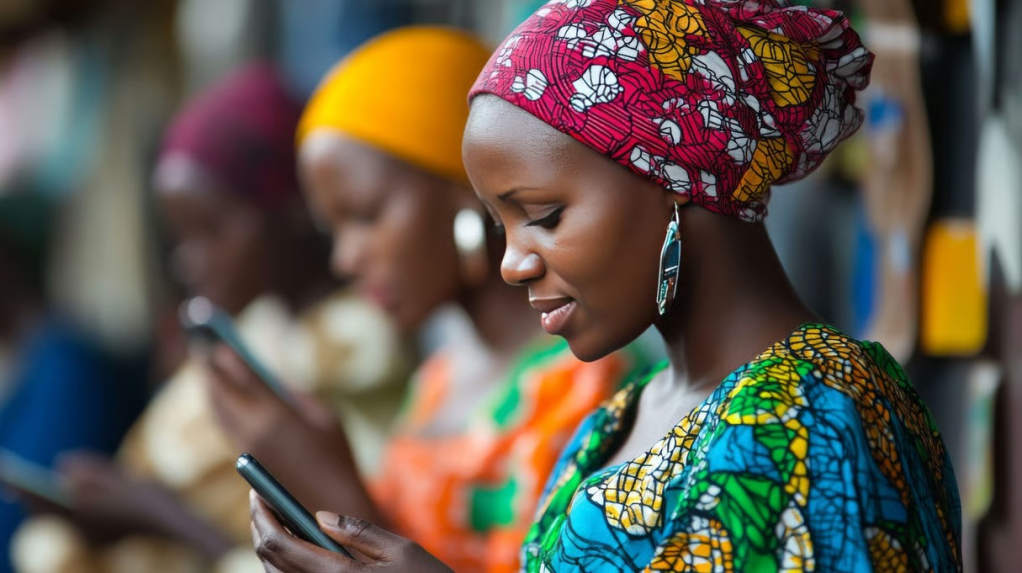
Africa’s telecoms industry has the potential to drive profound social and economic change. Yet, much of this potential remains untapped. In Sub-Saharan Africa, 27% of the population uses mobile internet services, leaving behind a 60% usage gap and a 13% coverage gap, according to the GSMA. The result is that millions remain disconnected, unable to access education, healthcare, or financial tools that could transform their lives.
Bridging these gaps requires more than simply building infrastructure—companies have to address deep, systemic challenges in affordability, access, and representation. Diversity, Equity, and Inclusion (DEI) play a key role in solving these problems, offering telecoms companies a way to expand their markets whilst promoting social progress.
The Cost of Exclusion
The economic case for inclusion is undeniable. The GSMA estimates that bringing the unconnected online could add $3.5 trillion to the global economy between 2023 and 2030, with 90% of the benefits flowing to low- and middle-income countries (LMICs). Yet, achieving universal mobile internet access will require an estimated $418 billion in infrastructure investment, much of it in rural, sparsely populated areas where connectivity remains a challenge.
Device affordability and low levels of digital literacy are major barriers to adoption in LMICs. MTN has addressed these challenges through innovative handset financing models, offering six-month to one-year payment plans that reduce the cost of acquisition for underserved communities. These initiatives recognise that infrastructure deployment alone cannot solve the inclusion challenge.
For women, the hurdles are even higher. In Sub-Saharan Africa, women are 37% less likely than men to use mobile internet services. This gap not only excludes women from digital opportunities but also holds back economic progress.
Youth unemployment is another pressing issue. In 2023, the youth unemployment rate in Sub-Saharan Africa was 8.9%, with young women facing a significantly higher rate. As Africa’s population grows—60% of its people are under the age of 25—the urgency of creating jobs and skills training programmes cannot be overstated.

LISTEN: Nompilo Morafo (MTN Chief Sustainability and Corporate Affairs Officer) explains CHaSE, MTN’s strategic framework for digital inclusion – and how MTN is responding with the MTN Skills Academy
Expanding Access to Connectivity
Telecoms companies are uniquely positioned to address these challenges by embedding DEI into their operations. By extending connectivity, promoting digital literacy, and empowering underrepresented groups, they can contribute to a more inclusive digital economy.
In rural Africa, where the coverage gap is most pronounced, telecoms companies are investing in infrastructure to reach remote areas. MTN has partnered with Africa Mobile Network (AMN) to bring mobile coverage to underserved regions. These efforts not only provide basic communication services but also enable access to mobile money, healthcare, and educational tools.
However, connectivity alone is insufficient. Understanding community needs and stakeholder priorities has become central to MTN’s approach to inclusive development. The company employs comprehensive stakeholder engagement strategies to ensure its investments align with local priorities and deliver meaningful impact.
Building Skills for the Digital Economy
Skills training is another critical component of DEI in the telecoms sector. MTN’s Skills Academy provides young Africans with training in areas like coding, app development, and data analytics. By working with local businesses, the programme ensures that participants gain practical skills that lead to real employment opportunities.
The programme addresses a critical gap: whilst coverage may be available, many young people lack the digital literacy to use technology meaningfully for economic advancement. MTN’s approach recognises that digital inclusion requires both infrastructure and education.
In Ghana, MTN’s financial literacy programmes have further empowered youth and women. Mobile money has become a powerful tool for financial inclusion, enabling people to save, invest, and manage their finances without needing a traditional bank account.
Empowering Women in Technology
Women face unique barriers in accessing and benefiting from the digital economy. MTN’s approach to women’s empowerment extends beyond traditional programmes to comprehensive business support. In Ghana, the company offers customised bundle services specifically designed for women businesses, providing:
These targeted interventions recognise that women entrepreneurs face distinct challenges and require tailored solutions to succeed in the digital economy.
MTN’s Women in Digital Business Challenge tackles broader systemic issues by offering financial support, mentorship, and training to female entrepreneurs. Participants receive R100,000 each to grow their businesses, along with access to networks and resources that help them succeed.
One participant in South Africa used the funding to expand her digital business and launch a community training programme, creating a ripple effect of empowerment.
Leadership representation has also become a priority. In 2022, MTN became the first African telecoms group to appoint women CEOs in multiple markets including Cameroon, Rwanda, and Uganda—a move that reflects its commitment to inclusion at the highest levels.
Breaking Barriers to Adoption
Despite these efforts, the usage gap remains the biggest challenge for telecoms in Africa. Device affordability, low digital literacy, and socio-cultural barriers continue to exclude large segments of the population. Women in particular face additional challenges due to household responsibilities and limited access to education.
For telecoms companies, addressing these issues is not just about expanding their customer base—it’s about ensuring that the benefits of digital transformation are shared equitably. The GSMA notes that simply closing the usage gap could unlock enormous economic and social benefits, particularly for LMICs.
The Business Case for DEI
Beyond its social impact, DEI is a powerful driver of innovation and profitability. Companies with diverse leadership teams are better equipped to solve complex problems and adapt to market changes. When leadership reflects the diversity of markets, organisations become more effective in meeting customer needs.
Telecoms companies also benefit from inclusive hiring practices, which expand their talent pools and foster creativity. For a sector grappling with rapid technological change, this adaptability is essential.
A Shared Responsibility
The road to universal connectivity and inclusivity is long, and telecoms companies cannot do it alone. Governments, regulators, and the private sector must collaborate to overcome barriers, whether by investing in infrastructure, subsidising devices, or promoting digital literacy.
Policymakers can play a crucial role by creating enabling environments for telecoms companies to operate. For example, harmonising regulatory frameworks across the African Continental Free Trade Area (AfCFTA) could facilitate investment and cross-border connectivity, unlocking significant economic potential.
Conclusion
The digital divide in Africa is both a challenge and an opportunity. For telecoms companies, it represents a chance to drive growth whilst addressing some of the continent’s most pressing socio-economic issues. By prioritising DEI, companies like MTN are not just connecting people—they’re empowering them to participate in a global digital economy.
The future of Africa’s telecoms sector is inclusive, connected, and full of potential. The challenge is making that future a reality for everyone.
Sources:
Published on Jeune Afrique 17 July 2025: Promoting diversity, equity and inclusion in the telecommunications sector in Africa

MTN Group has embarked on an exciting journey to leverage responsible Artificial Intelligence (AI) to reshape Africa at the leading edge of technology, igniting change, inspiring progress and creating a brighter future for generations to come.
“AI is no longer an enabler — it’s the engine reshaping businesses, redefining value creation and rewriting the rules of global innovation and competitiveness,” says MTN Group Digital Infrastructure CEO and GCTIO Mazen Mroué. “AI is not just about automation — it’s about boosting human potential, increasingly becoming seamlessly embedded into our daily activities, decisions and experiences, transforming how we live and work.”
He says AI is augmenting human intelligence like never before and “we at MTN are developing AI for Africa by Africans, unlocking sustainable value for all”.
According to PwC’s Global Artificial Intelligence Study, AI can transform global productivity and economic activity and is predicted to add US$15.7 trillion to the global economy by 2030.
Assuming Africa captures 10% of the global AI market, a recent SAP report projects that AI could add US$1.5 trillion to the continent’s economy by 2030. The SAP report also predicts that 230 million new digital jobs will be created in Africa by 2030. Statista projects that the AI market in Africa could reach US$4.51 billion in 2025 and grow to US$18.7 billion by 2030.
As AI adoption accelerates, the GSMA says it is crucial that it is designed, developed and deployed with ethical considerations in mind. As a result, the industry association collaborated with a group of operators and others to co-create a Responsible AI Maturity Roadmap, supporting the advancement of innovative and trustworthy AI applications.
MTN’s AI journey is designed around three key principles, in line with global best practice. These encompass a comprehensive governance structure aspiring to achieve ethical, effective and safe AI adoption; an agile and scalable operating model for measured AI implementation; and targeted use cases that deliver tangible value.
MTN has developed a world-class Responsible AI Policy to guide AI deployment and usage. It has also set up a special sub-committee of the Executive Committee to provide oversight, execution governance and impact management of the Group’s IT governance, with a special focus on AI.
As data quality, talent excellence, strategic partnerships and robust infrastructure are all essential to a successful AI implementation journey, MTN has designed an appropriate operating model and established an in-house AI Centre of Excellence (CoE) alongside a Cloud CoE to co-ordinate AI activities across the Group, supported by an internal Software Solutions team equipped with more than 300 engineers.
Driven to deliver tangible value for customers, communities and the business, MTN has identified numerous AI use cases across key business domains including Network, Finance, HR and Commercial functions.
“At MTN Group, under the group-wide transformation programme branded as ‘MTN Genova’, we are operationalising AI at scale to boost productivity, elevate customer experience, reduce costs and accelerate revenue generation,” says Mroué.
Through our strategic partnerships, we have adopted enterprise-grade Open AI and cloud-native services to implement AI and generative AI solutions powered by large and small language models (LLMs and SLMs). In parallel, we are promoting innovative collaborations with start-ups focused on local language LLMs to elevate customer experience solutions.
In the network domain, MTN is promoting interesting use cases like intelligent AI-enabled fuel consumption savings for data centres in South Africa; AI-driven cell site dynamic energy management in Benin; AI-driven fibre cut sensing in Côte d’Ivoire; and network traffic balancing and optimisation in Nigeria.
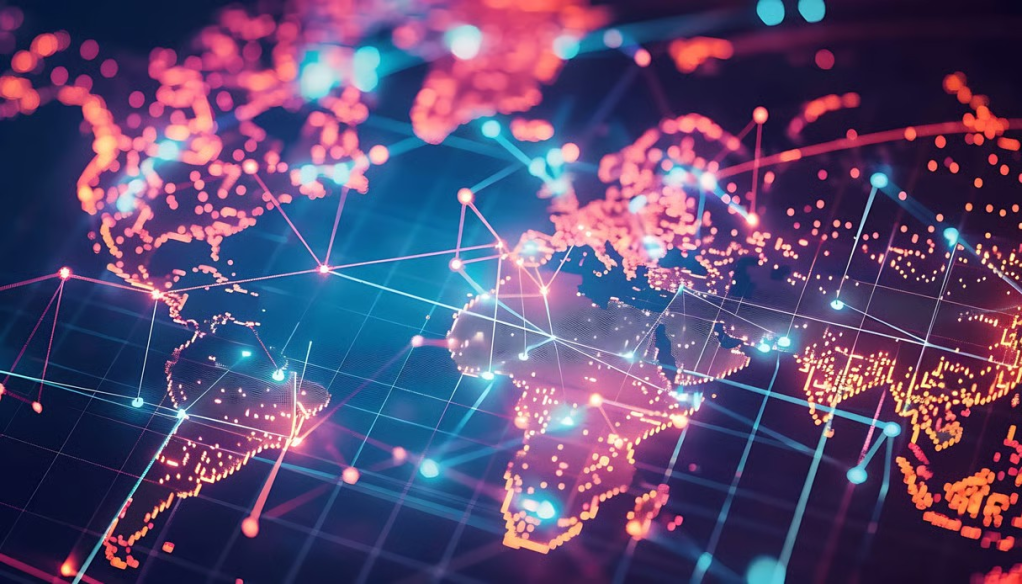
What happens when a continent connects? In Africa, where vast distances and varied landscapes often separate communities, telecom infrastructure becomes the common thread that connects economies, entrepreneurs and daily lives.
Over the past few decades, connectivity has evolved from luxury to necessity—quite literally the backbone of Africa’s growth. Consider this: By the end of 2023, mobile phone penetration in Sub-Saharan Africa stood at over 44% – half a billion people – according to the GSMA 2024 report. Mobile internet penetration reached 27%, highlighting significant progress in closing the digital divide through infrastructure investments.
Flashback to 1996-a transformative year for telecommunications globally and in South Africa. Companies like Microsoft and Amazon were laying the foundation of the internet economy, while email and GSM networks revolutionised communication. The 24-hour economy had arrived. That same year, MTN launched operations in South Africa, a step that would redefine connectivity in the country and catalyse economic transformation across the continent.
Nearly three decades later, MTN’s journey across Africa offers a compelling case study to assess how connectivity has reshaped South, Central, and West Africa. Through innovation, resilience, and partnerships, the company has played a starring role in this digital transformation story that continues to unfold.
The Economic Lifeline of Connectivity
Connectivity is more than a convenience; it’s an economic lifeline. Across South, East, Central, and West Africa, telecom networks have empowered entrepreneurs, expanded markets, and driven financial inclusion. These developments were forecast in the past by institutions such as the World Bank, which noted that innovative business models and expanding internet access would be key drivers for fostering economic growth and job creation in underserved regions.
MTN’s Beyond 2025 Ambition positions connectivity as a critical pillar to drive economic impact and support national agendas across Central and West Africa. The company’s connectivity strategy has enabled the build of 2G/3G/4G and 5G networks providing population coverage of more than 90% in most markets, establishing networks that contribute positively to sustainability initiatives through decarbonization efforts referred to as Project Zero.
In Ghana, mobile connectivity fuels small businesses and e-commerce. MTN’s extensive 4G network has turned informal markets into thriving digital ecosystems, linking sellers with buyers far beyond their communities. Stephen Blewett, MTN Ghana CEO, explains the company’s mission: “Everybody deserves the benefit of a modern connected life,” which places a responsibility on MTN Ghana to drive connectivity into rural and underserved areas.
Meanwhile, in Cameroon, network expansion projects have empowered rural farmers to access real-time market data, increasing productivity and earnings. By linking underserved communities to broader economic ecosystems, connectivity has become a tool for empowerment.
WATCH: Ebenezer Asante (SVP of Markets, MTN Group) reveals why MTN now collaborates with its competitors – and how this changes everything about African business.
Bridging the Gap: Challenges of Expanding Connectivity
Connectivity may be transformative, but building the networks that deliver it is no small feat. High infrastructure costs, regulatory hurdles, and physical barriers in remote regions have historically slowed progress. According to this datareportal.com report, as of early 2024, nearly 60% of Cameroon’s population resides in urban areas, while just over 40% live in rural regions. Internet penetration across the country is approximately 44%, indicating that more than half of the population still lacks access to online services.
Overcoming these barriers requires ingenuity and collaboration. Strategic partnerships using OpenRAN technology have enabled MTN to deploy cost-effective rural solutions, while the company’s Network as a Service strategy has facilitated collaboration with competitor operators to allow national roaming services, subsequently increasing network footprints across markets.
Beyond traditional vendor partnerships, MTN has joined forces with Africa’s leading telecommunications operators in an unprecedented industry alliance. This collaboration represents a shift from competitive isolation to collective problem-solving, addressing challenges that no single operator can tackle alone.
MTN has pioneered solutions like solar-powered base stations and innovative green solutions to manage power infrastructure challenges in rural areas. The company has also introduced handset financing models across markets, offering six-month to one-year payment plans to address device affordability barriers in rural communities.
Building infrastructure is only the first step, notes Mitwa Kaemba Ng’ambi, MTN Côte d’Ivoire CEO. While MTN has achieved significant coverage expansion, the real challenge lies in ensuring meaningful usage of these services. Public-private partnerships have proven essential, and collaborations with local governments have streamlined processes and reduced deployment timelines for tower installations. Says Africa Analysis senior analyst, Chris Ngwenya, “Connectivity must be treated as critical infrastructure, like roads and electricity, to ensure no one is excluded.”
WATCH: Mitwa Kaemba Ng’ambi reveals the reality of MTN’s customers – and why building networks isn’t the real challenge anymore.
Entrepreneurship and Digital Access: A Virtuous Cycle
Connectivity has sparked a wave of entrepreneurship across Africa, particularly in fintech, e-commerce, and agritech. If the GSMA is correct, the internet economy is projected to reach 5.2% of the GDP in Africa by 2025, where small and medium enterprises (SMEs) are the backbone of this growth, relying on robust telecom networks to scale their operations.
In Ghana, connectivity-powered digital tools have enabled SMEs to expand beyond their traditional markets. Farmers now use mobile apps to track crop prices, connect with buyers, and optimise supply chains. MTN’s massive drive to acquire the SME market includes customized bundle services for women businesses, helping them stay connected, gain access to markets, access capital through financial partners, and utilize SME toolkits including website access and business support tools.
And in Cameroon, similar initiatives have allowed small businesses to access online platforms, tapping into regional and global trade.
Affordable, reliable connectivity is central to sustaining this momentum. “For SMEs to thrive,” says Chris Ngwenya, “They need an ecosystem that supports scalability, education, and trust in the digital economy.”
The rise of digital platforms has also spurred innovation in education and healthcare. In Ghana, schools equipped with digital tools powered by MTN’s network have brought resources to underserved communities through partnerships like the GIFEC project, which has enabled connectivity to reach 2,016 rural locations. In Cameroon, MTN Foundation programs have improved healthcare delivery by connecting rural clinics to urban hospitals for diagnostics and telemedicine.
Looking Ahead: A Connectivity Revolution
The next phase of connectivity in Africa indicates it will be as transformative as the last. With 5G trials underway in Ghana and IoT applications on the rise, agriculture, healthcare, and education innovations are set to reshape the continent. But questions remain: how do we ensure these benefits reach rural and underserved areas? And who will bear the costs of deploying next-generation networks?
Mobile money services like MoMo as discussed in our previous article in this series—have already played a central role in bridging gaps in financial inclusion. By aligning its growth strategy with the growing needs of African economies, MTN can look forward to continuing to connect people to opportunity across the continent.
Additional Resources: Africa Analysis white paper: ‘Africa Broadband Outlook 2024’.
Published on Jeune Afrique 07 July 2025: Beyond the Cell Tower: What It Really Takes to Connect a Continent

In a continent where traditional banking has long struggled to reach rural and underserved areas, mobile money is rewriting the financial playbook. Led by pioneers like MTN’s MoMo platform, mobile money services are driving financial inclusion, fostering economic growth, and transforming how millions of Africans access and manage their money.
From urban centres to remote villages, mobile money has become greater than the transactional service it offers on paper. MTN’s MoMo platform now operates in 14 countries across Africa, connecting the unbanked to the formal economy, empowering entrepreneurs, and enabling governments to deliver subsidies and social payments at scale. But for the group, MoMo’s true impact lies deeper. It’s also about restoring dignity through financial independence, “to provide them with the ability to manage their lives in easy ways,” says Serigne Dioum, Group MTN Fintech CEO.
A Trillion-Dollar Milestone
The numbers tell a powerful story. Across Sub-Saharan Africa, mobile money platforms processed over $1.4 trillion in global transaction values in 2023, with the region contributing the lion’s share. This growth comes as mobile phone penetration continues to expand, bringing financial tools into the hands of those traditionally excluded from banking.
In Ghana, the transformation is particularly striking. Mobile money transactions in the country reached GH¢1.912 trillion in 2023, a staggering 78.7% increase from GH¢1.07 trillion in 2022. With 15.2 million active users and a network of 228 000 agents, Ghana demonstrates how mobile money has redefined financial access.
Shaibu Haruna, CEO of MTN Mobile Money Ghana, sees MoMo as central to this progress. “MoMo has scaled effectively to make a real difference—not just in Ghana but as a model for financial inclusion across Africa,” he says.
Cameroon tells a similar story. While recent figures are less robust, the Bank of Central African States (BEAC) reported in 2022 that mobile money remains the dominant financial tool in the CEMAC (Economic and Monetary Community of Central Africa) region. Cameroon leads in mobile money accounts and transaction volumes, underscoring its role as a regional hub.
Driving Innovation Through Necessity
The pandemic gave mobile money its moment. As COVID-19 forced countries into lockdowns and disrupted traditional banking services, contactless payments became essential. Mobile money platforms stepped up, providing a secure and accessible way for individuals to manage finances, pay bills, and receive government relief funds.
For MTN, the pandemic was a turning point. The company leveraged the opportunity to expand its offerings, moving beyond simple peer-to-peer (P2P) transfers. Today, MoMo supports bill payments, microloans, cross-border remittances — and increasingly, commerce.
Watch as Serigne Dioum, Group MTN Fintech CEO, explains how MTN supports millions of merchants across Africa through its in-app marketplace.
A Regional Shift
While East Africa has long been the epicentre of mobile money innovation, driven by Kenya’s M-Pesa, the balance is shifting. West Africa is emerging as a new powerhouse, with Ghana and Côte d’Ivoire recording the fastest growth rates in 2023, outpacing East Africa by 12 percentage points.
In Côte d’Ivoire, MTN is making large-scale investments in both digital and financial inclusion. The shift highlights MTN’s strategic positioning in the region. With its expansive customer base and focus on financial inclusion, MTN is ensuring that even remote areas are connected. In Ghana, for instance, the company’s MoMo agents are present in villages far removed from traditional banking infrastructure, in an effort to secure as many customers as possible.
However, challenges persist. Interoperability between mobile money platforms remains limited, creating friction in cross-border transactions. In Cameroon, regulatory hurdles have slowed progress, but MTN is actively working to address these issues. “Building trust starts with security and partnerships,” says Alain Nono, CEO of MTN Cameroon Mobile Money. “We work closely with regulators to ensure that MoMo complies with local laws and protects our users from fraud.”
The Power of Financial Inclusion
At its core, mobile money is about access—access to funds, markets, and opportunities. For millions of Africans, MoMo has become the gateway to participating in the economy.
In rural Ghana, farmers use MoMo to receive payments for their produce without travelling to distant cities. Small businesses in Cameroon rely on mobile money to manage cash flow and pay suppliers. Across Africa, mobile money has slashed remittance costs, making it easier for migrant workers to support families back home.
Stephen Blewett, CEO of MTN Ghana, believes that digital access underpins both commercial and social progress. “Affordable devices are a gateway to the digital ecosystem,” he says. “Every user who comes online represents an opportunity — not just for revenue, but for innovation and inclusion.”
This transformation extends beyond individuals. A 2023 World Bank study found that regions with high mobile money adoption saw 12% higher local market activity compared to areas with low adoption. The economic ripple effect of mobile money is undeniable, fuelling growth from the ground up.
The Challenges Ahead
Despite its successes, mobile money faces hurdles. Cybersecurity is an ongoing concern, with mobile money providers reporting a 22% increase in fraud attempts in 2023. Regulatory frameworks also need to evolve to keep pace with the sector’s growth, balancing innovation with user protection.
While governments grapple with how to tax digital services, the wrong policy choices risk slowing adoption and limiting access. MTN has taken a proactive stance in shaping a more inclusive environment.
Watch here for Serigne Dioum’s view on regulatory engagement and mobile money tax policies.
Characteristic of burgeoning economies, the mobile money landscape is evolving with new entrants introducing alternative models to cater to Africa’s growing demand for affordable digital financial services. FinTech companies are experimenting with lower fees and innovative service offerings, creating healthy competition and driving the industry toward greater affordability. These shifts, while challenging for traditional players, present an opportunity for market leaders like MTN to reaffirm their commitment to accessible and secure financial solutions across the continent.
MTN is rising to the challenge. By investing in advanced tech security measures and forging partnerships with regulators, MoMo remains a trusted platform. Interoperability is also high on the agenda, with MTN advocating for seamless transactions across borders.
Looking Forward
The potential for mobile money in Africa remains vast. The African Continental Free Trade Area agreement promises to unlock $80 billion in annual transaction values by 2025, creating new opportunities for growth.
For MTN, as it expands its footprint and deepens its offerings, the company positions itself as a leader in Africa’s financial revolution. “MoMo is not just about transactions,” says Dioum. “It’s about empowering people, creating opportunities, and driving economic growth.”
With its commitment to innovation and inclusion, the company is the continent’s bright spot, a clear leader of change.
Published on Jeune Afrique 30 June 2025: Mobile Money: A Structural Transformation of the African Economic Landscape
Accra, Ghana, June 22, 2025 – Demonstrating its commitment to advancing Africa’s development, MTN Group supported the 2025 Economic Governance School training for public officials from Ghana, South Africa and Kenya held in Accra last week.
The initiative, the result of collaboration between South Africa’s National School of Government (NSG), the Kenya School of Government (KSG) and the Ghana Institute of Management and Public Administration (GIMPA), is designed to strengthen senior leadership in the public sector and promote inclusive economic governance across the continent. It brings together legislatures, politicians and senior officials from all levels of the public service for a week of peer learning, policy dialogue and institutional exchange. Consequently, the delegation took time to visit the African Continental Free Trade Area (AfCFTA) Secretariat, which is charged with coordinating the creation of a single continental market for goods and services across Africa.
“As a pan-African business, we understand that Africa’s growth depends not only on investment in infrastructure, but also in people and institutions,” said Nompilo Morafo, MTN Group Chief Sustainability and Corporate Affairs Officer.
Since the training took place during MTN Group’s flagship 21 Days of Y’ello Care, the delegation also visited the MTN Ghana supported Opportunities Industrialisation Centre (OICG), which provides vocational, digital and entrepreneurial skills training for young people to enable them to earn a decent and dignified living.
“At MTN, we believe that everyone deserves the benefits of a modern connected life; therefore, in our view, education, training and strong institutions form the foundation for sustained progress. Also, when civil servants, policymakers and administrators are equipped with high-quality training, their collective decisions shape a more equitable, innovative and resilient future for their nations.”
MTN’s involvement reflects its broader approach to driving Africa’s progress through investment in leadership and institutional capacity. In addition to sponsoring the NSG, KSG and GIMPA programme, the Group contributed to the discourse, with senior executives participating in sessions focused on telecommunications, digital transformation, artificial intelligence and infrastructure financing.
MTN Ghana CEO Stephen Blewett and CIO Bernard Acquah joined Morafo in engaging on panels that explored the intersection of technology and governance. Discussions focused on the digital transformation of public services and the role of AI and infrastructure investment in supporting state capacity and economic inclusion.
South Africa’s Deputy Minister of Public Service and Administration Ms. Pinky Kekana, described the initiative as a valuable platform for engagement on governance challenges, saying: “The Economic Governance School offers a unique platform for elected and appointed public leaders to engage in critical analysis and reflective dialogue on the complex challenges confronting governance.”
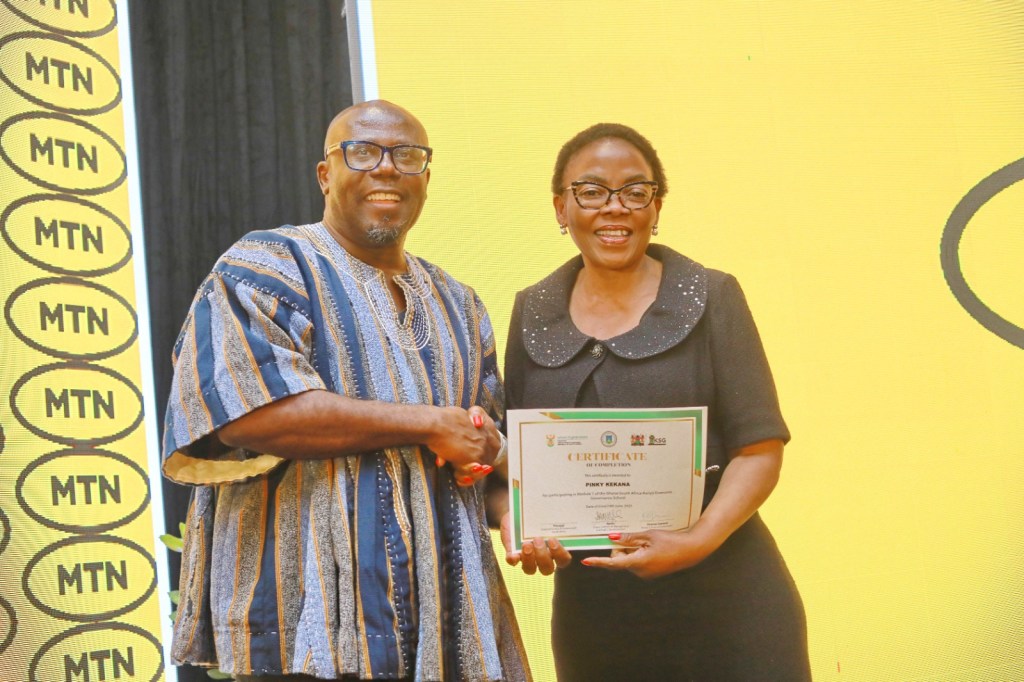
Director of GIMPA, Prof. Samuel Kwadwo Bonsu, welcomed MTN’s contribution and the cross-sector collaboration underpinning the programme: “We are proud as GIMPA to serve, not only as a centre of learning but as a convening ground for critical reflection and collaboration.”